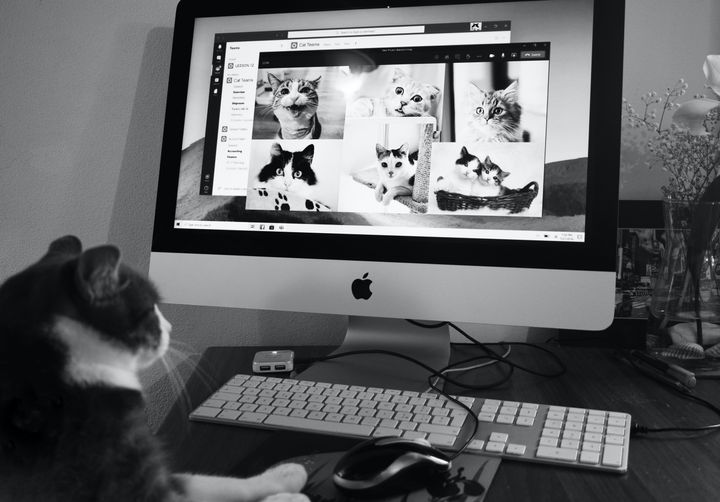8 Signs You Are A People Pleaser (And How To Stop!)
Are you a people pleaser? Learn how to spot the signs and become a recovering people pleaser!

The instinct to make others happy and comfortable and to keep the peace, regardless of the ramifications, is familiar to me. That hyper-awareness of changes in tone or body language and the immediate need to smooth things over. Or the overpowering urge for the words “I’m sorry” to fall from my lips at causing even the barest inconvenience to others. Or how about that core desire to be liked and seen as helpful and “easy.”
No trouble here.😇
…(just constant anxiety and bubbling resentment. 😬)
Just as I have long been a recovering impostor, I am a recovering people pleaser.
A people-pleaser is “a person who has an emotional need to please others, often at the expense of his or her own needs or desires”[1]. It’s one of those deeply ingrained impulses with various origins, from upbringing to cultural and social programming, but it has wide-reaching impacts on how one experiences life. It’s one of the most common topics in my productivity consulting sessions and a primary reason many of my clients’ schedules are out of control.
It seems like it shouldn’t necessarily be a bad thing because, at its heart, people-pleasing indicates that you are kind, enjoy making others happy, and value relationships. But it quickly becomes a bad thing when that kindness is always at your own expense and without consideration for your needs or wants. At its worst, people-pleasing morphs into social martyrdom and bitterness, which is not fun for anyone.
So, how can you become a recovering people pleaser, too?
8 signs you are a people pleaser
First off, in case there is any doubt in your mind that you are a people pleaser, here are eight signs:
1. You have difficulty setting boundaries or saying no
Regardless of whether or not you want to do something or have any time, energy or inclination to do it, you say yes to things to avoid disappointing or upsetting others.
2. You dislike and actively avoid conflict
Conflict of any kind makes you anxious. You avoid confrontation and are sensitive to shifts in people's moods and body language. You will acquiesce to other people's desires just to keep the peace, even when you disagree.
3. You seek external validation
You look to others for approval, recognition, and validation. Your self-worth depends on others’ opinions of you, you have difficulty making independent decisions, and external sources of feedback easily influence how you feel about yourself.
4. You often over-commit yourself because you want to be seen as helpful and easy
You are the first to volunteer for extra responsibilities or to do favours for others. You take pride in always saying yes, being 100% available, and being highly responsive to others' requests.
5. You put others' needs before your own, at your own expense
You often have difficulty getting to your work commitments and priorities because you are helping others with theirs. There is no time for your hobbies or interests. You might not even know what your hobbies and interests are because you’ve never allowed yourself the time to explore them. You will still do things, even if you don’t feel well or don’t want to.
6. You go out of your way to be liked
You worry that others won’t like you if you don’t do things for them or always seem agreeable. You accept tasks or commitments that are inconvenient so they will be happy or agree to unreasonable timelines. You rarely show negative emotions or disapproval to others.
7. You apologize excessively
You say “sorry” for the most minor things or things that are not your fault.
8. You often feel resentful or taken advantage of but still say yes
You often feel underappreciated and that your sacrifices go unnoticed by others. You sometimes resent that you are the person who does things or says yes but feel like you have to.
If you enjoy reading Every Intention, share it with someone you think might like it, too!
How to Stop People-Pleasing
Oof, just writing those signs made me realize I probably have further to go in my people-pleasing recovery journey than I thought. 😅
While the instinct to people-please will likely stick with you, there are ways to become more aware of where that instinct comes from and when it happens and be more thoughtful about your actions in response to it.
1. Therapy or coaching
Or both! Digging into the origin and impact of your people-pleasing with a professional is a good place to start. People-pleasing is often a part of your identity and something you might take pride in, even when it’s unhealthy or damaging. Working through where the instinct to people-please comes from in a healthy, safe place can help you start the process of disentangling people-pleasing from who you are to something you do (to something you do sometimes).
2. Daily self-reflection
Noticing when something is happening is the first step to changing it. The automatic behaviours and thoughts associated with people-pleasing are well-trodden paths in your brain. Still, a little self-awareness can go a long way toward encouraging you to break new ground.
Take a few minutes at the end of each day to reflect on what happened and how you reacted. Did you people-please? What happened in your body? What are the impacts?
3. Practice Saying No
It’s hard and will feel terribly uncomfortable, but start the practice of saying no! It will take practice, and just like anything unfamiliar, it will take time to feel easier.
I wrote an article about Obligation Elimination And The Power of Saying No a few years ago, and one of the quotes I included was from author James Clear, who said, "Needless commitments are more wasteful than needless possessions. Possessions can be ignored, but commitments are a recurring debt that must be paid for with your time and attention."
Start small! If you don’t want to do something or don’t have the available time or energy, use firm but kind responses, such as “I appreciate the offer, but I’m not available.” Or “Thanks for thinking of me, but I can’t take on anything else right now.”

4. Sleep on it
To help you say no to things, start the habit of never agreeing to anything on the spot (where possible). Before you commit to something, sleep on it or take some time before you automatically say yes. Give yourself some space to consider how it impacts you and whether it’s something you actually want to do.
5. Articulate your hard and soft boundaries (what are your priority pillars?)
Your boundaries are simply the limits of your comfort, what you value, and how you want to be treated. Some of those limits will be non-negotiable, where there are no (or few) circumstances under which you are willing to change your mind. Your soft boundaries are the ones you are willing to adjust if need be.
People pleasers tend to struggle to set and keep any boundaries, hard or soft. A good reflection exercise is to write down the boundaries you want to set. It can make it easier to keep them once you make them clear in your own mind by articulating them.
- What are the things you say are priorities that you are not prioritizing?
- What are the things you say are important to you that you are not paying attention to?
- What are the things that bring you joy and happiness?
Ask yourself: If I say yes to this, does it impact the things I want to prioritize?
6. Replace “I’m sorry” with “Thank you…”
The ideal end goal is to not apologize for anything unless you have genuinely wronged someone or need to take responsibility for a mistake, not just to smooth things over. However, over-apologizing is tricky since it’s such a deeply ingrained habit that sometimes the words are already out of your mouth before you can stop them.
One way to reduce how often you apologize (depending on the context) is to replace “I’m sorry” with “Thank you.” For example,
- “Sorry I’m late,” becomes, “Thank you for waiting.”
- “Sorry for the delay” becomes, “Thank you for your patience.”
- “I’m sorry for taking up your time,” to “Thank you for helping me.”
Of course, a thank you doesn't always make sense, but when it does, give it a try when you can feel that sorry bubble up on your lips.
7. Get Comfortable with Discomfort
It’s much easier said than done, but to break out of people-pleasing behaviours, you eventually have to accept that some people won’t always be happy with your choices. And that’s okay! It’s going to feel uncomfortable. But remember, you are not responsible for other people's emotions and are allowed to put your needs and wants first.
Questions to help you reflect on your motivations
When you think about your motivations for making a commitment or saying yes to something, ask yourself the following questions to do a self-check on your people-pleasing:
- Am I doing this out of genuine care or fear? (Of rejection, conflict, not being liked, etc.)
- Do I want to do this?
- Do I have the time and space to fit this in among my other commitments?
- Does this align with my priorities? (Actual priorities)
- What are the potential consequences of saying no?
- Are those consequences real or imagined?
- What are the potential consequences of saying yes? (What’s the opportunity cost)
Breaking ingrained habits and relearning new ones is hard. People-pleasing thought patterns and behaviours are no different. It takes time, patience, and practice, but it’s possible! Start small, experiment and forgive yourself when you fall into old patterns. Each day is a new opportunity to try again!
Does your people-pleasing keep your schedule out of control? Let's chat about how I can help you!
Share
Ashley Janssen

Productivity consultant, writer, speaker, serial entrepreneur, chaos calmer, introvert, cat-lady. Lover of books, fitness, old fashioned’s, basketball, and video games.
Follow me on
Twitter
or
LinkedIn.
Hire me for
1 on 1 productivity consulting
or
speaking.
Related articles

4 Ways to Reconnect to Your Habits and Reset Your Boundaries When They Slip

How to Set Boundaries When You Work From Home


Comments ()